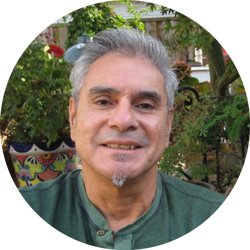ENRIQUE SALMÓN on Moral Landscapes Amidst Changing Ecologies /225
Photo of a black-tailed jackrabbit sitting on a trail in the Southwest desert by Nick Fox.
We are often reminded of the tremendous amount of loss that transpires every day on this Earth; loss of language, biodiversity, and ancestral knowledge. In response, it’s understandable that many of us may be hyper-fixated on preserving whatever we can and fighting to stave off the mass changes that have been set in motion. But what if we challenged ourselves instead to recognize the autonomy of living knowledge, land as its own entity, and the inevitability of constant change? In this week’s episode, guest Enrique Salmón uses the lens of kincentric ecology to challenge our propensity for memory banking, our difficulty grappling with a changing Earth, and our inadvertent oversimplifications of complex living relationships.
Our conversation begins by looking at how kincentricity is different from many other ecological teachings that remain mired in the historical legacy of environmentalism and science, a legacy which has historically disavowed the human as a way to exalt their respective fields, instead, Enrique provides examples of humans being “keystone species”. Our conversation explores moral landscapes, trickster energy, resilient thinking, and the importance of having stories that are encoded and embedded in the land itself.
“The land is a living entity and it is constantly in conversation with those of us who know how to listen to it.”
Photo of Enrique Salmón
Enrique Salmón is a Rarámuri. He is head of the American Indian Studies Program at Cal State University–East Bay. He holds a Ph.D. in anthropology from Arizona State University and has published many articles on Indigenous ethnobotany, agriculture, nutrition, and Traditional Ecological Knowledge. He is the author of Eating the Landscape: American Indian Stories of Food, Identity and Resilience and Iwígara.
♫ Music featured in this episode is “Wood Drops” by Justin Crawmer, “The World Survives” by Katie Gray, and “Queen Nzinga” by Sara Serpa.
Episode References
Iwígara: American Indian Ethnobotanical Traditions and Science by Enrique Salmón
Kincentric Ecology: Indigenous Perceptions of the Human-Nature Relationship by Enrique Salmón
Original Instructions: Indigenous Teachings for a Sustainable Future
Enrique’s Recommendations
Eating the Landscape: American Indian Stories of Food, Identity, and Resilience by Enrique Salmón
The Colors of Nature: Culture, Identity, and the Natural World edited by Alison H. Deming and Lauret E. Savoy
Wildness: Relations of People and Place by Gavin Van Horn and John Hausdoerffer
We aim to be a gathering place for ideas and solutions ensuring that the growing body of work that we steward remains accessible to the public. If you want to see us continue, or perhaps are especially moved by the episode you are listening to today, please become a monthly sustaining member through our Patreon or consider making a one-time donation directly to us through our website. To stay up-to-date on our work, sign up for our newsletter.



For The Wild Podcast is an anthology of the Anthropocene; focused on land-based protection, co-liberation and intersectional storytelling rooted in a paradigm shift away from human supremacy, endless growth and consumerism.